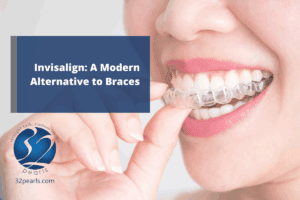
Exploring Invisalign as a TMJ Treatment Solution: An Informative Guide
Temporomandibular Joint Disorder, commonly known as TMJ, is a condition that affects the joints connecting your jawbone to your skull. These joints play a crucial role in daily activities like chewing, speaking, and even breathing. When they become misaligned or stressed, it can lead to a variety of uncomfortable symptoms, including jaw pain, headaches, difficulty chewing, and even earaches. Many people suffering from TMJ disorder are often in search of a solution that not only alleviates their pain but also addresses the root cause of their discomfort.
One of the emerging treatment options for TMJ is Invisalign, a well-known orthodontic treatment typically used for straightening teeth and correcting bite issues. But can Invisalign also help with TMJ? In this guide, we’ll explore how Invisalign might serve as a treatment solution for TMJ, and what you need to know if you’re considering this option.
Understanding TMJ Disorder
Before diving into how Invisalign may help with TMJ, it’s important to understand what TMJ disorder is and what causes it. The temporomandibular joints are located on each side of your jaw and act like sliding hinges, connecting your jawbone to your skull. TMJ disorder can occur when these joints become misaligned, stressed, or damaged.
Common causes of TMJ disorder include:
- Misaligned Bite: A significant number of TMJ cases are due to an improper bite, where the upper and lower teeth do not align correctly. This misalignment can place stress on the jaw joints, leading to pain and discomfort.
- Teeth Grinding (Bruxism): Grinding or clenching your teeth, especially during sleep, can strain the jaw muscles and joints, leading to TMJ disorder.
- Arthritis: Conditions like osteoarthritis or rheumatoid arthritis can affect the temporomandibular joints, causing pain and inflammation.
- Injury or Trauma: A direct injury to the jaw or head can damage the temporomandibular joints and lead to TMJ symptoms.
- Stress: High levels of stress can cause tension in the jaw muscles, which may contribute to TMJ disorder.
Symptoms of TMJ disorder vary from person to person but commonly include jaw pain, headaches, clicking or popping sounds in the jaw, difficulty chewing, and limited movement of the jaw.
How Invisalign Works
Invisalign is a modern orthodontic treatment that uses a series of clear, custom-made aligners to gradually move your teeth into the desired position. Unlike traditional braces, Invisalign aligners are virtually invisible, removable, and designed to fit comfortably over your teeth.
The Invisalign treatment process involves:
- Consultation and Assessment: The first step is to consult with an orthodontist who will assess your dental and jaw alignment. Digital scans and X-rays may be taken to create a detailed treatment plan.
- Custom Aligners: A series of custom aligners will be created based on your treatment plan. Each aligner is worn for about one to two weeks before moving on to the next set, gradually shifting your teeth into alignment.
- Monitoring Progress: Regular check-ups with your orthodontist will ensure your treatment progresses as planned. Adjustments can be made as needed to achieve the best results.
- Completion and Retainers: After completing the series of aligners, retainers are typically worn to maintain the results and prevent teeth from shifting back to their original positions.
Invisalign is primarily known for correcting crooked teeth, gaps, and bite misalignments such as overbites, underbites, and crossbites. However, its potential benefits for TMJ disorder are gaining attention.
Invisalign as a TMJ Treatment Solution
The key to understanding how Invisalign may help with TMJ disorder lies in its ability to correct bite alignment. Since a misaligned bite is a common cause of TMJ, correcting the alignment of the teeth and jaws can potentially relieve the stress on the temporomandibular joints.
Here’s how Invisalign might help with TMJ:
- Bite Correction: One of the main benefits of Invisalign is its ability to correct bite issues such as overbites, underbites, and crossbites. By aligning the teeth and jaws correctly, Invisalign can reduce the uneven pressure on the temporomandibular joints, which is often a major factor in TMJ disorder.
- Jaw Alignment: Invisalign aligners can be designed to not only straighten teeth but also adjust the position of the jaw. Proper jaw alignment can alleviate strain on the TMJ, leading to reduced pain and discomfort.
- Teeth Grinding Relief: For individuals who grind their teeth, Invisalign aligners can serve as a protective barrier, reducing the impact of grinding and clenching on the jaw joints. This can help alleviate TMJ symptoms related to bruxism.
- Improved Functionality: By creating a more balanced bite and better jaw alignment, Invisalign can improve the overall functionality of the mouth, making it easier to chew and speak without discomfort.
It’s important to note that while Invisalign may offer relief for TMJ symptoms, it is not a guaranteed cure for the disorder. TMJ is a complex condition with multiple potential causes, and what works for one person may not work for another. Therefore, a thorough assessment by a dental professional is essential to determine if Invisalign is a suitable option for your TMJ treatment.
Is Invisalign Right for Your TMJ?
If you’re considering Invisalign as a treatment option for TMJ, the first step is to consult with a qualified orthodontist or dentist who has experience in treating TMJ disorders. During your consultation, the orthodontist will evaluate your bite, jaw alignment, and the severity of your TMJ symptoms.
In some cases, Invisalign may be recommended as part of a comprehensive treatment plan that also includes other therapies such as physical therapy, stress management, or the use of a nightguard. In more severe cases of TMJ, where the joints are significantly damaged or where there is arthritis involved, additional treatments such as medication, injections, or even surgery may be necessary.
It’s also important to have realistic expectations. While Invisalign can provide significant improvements in bite alignment and potentially reduce TMJ symptoms, it may not completely eliminate all symptoms, especially if there are other contributing factors like stress or arthritis.
Other TMJ Treatment Options
In addition to Invisalign, there are several other treatment options for managing TMJ disorder, including:
- Nightguards: Custom-made nightguards can help protect the teeth from grinding and clenching, reducing strain on the TMJ.
- Physical Therapy: Exercises and stretches designed to strengthen the jaw muscles and improve range of motion can be beneficial for TMJ relief.
- Medication: Anti-inflammatory drugs, muscle relaxants, or pain relievers may be prescribed to manage TMJ symptoms.
- Stress Management: Since stress is a common trigger for TMJ, techniques like relaxation exercises, mindfulness, and counseling may be recommended.
- Surgery: In severe cases, surgical intervention may be necessary to repair or replace damaged joints.
Conclusion
Invisalign offers a promising solution for those suffering from TMJ disorder, particularly if the root cause is related to bite misalignment. By correcting the alignment of the teeth and jaw, Invisalign can help alleviate stress on the temporomandibular joints and reduce TMJ symptoms. However, it’s important to undergo a thorough evaluation by a dental professional to determine if Invisalign is the right treatment for your specific case.
If you’re struggling with TMJ and are interested in exploring Invisalign as a treatment option, schedule a consultation with a qualified orthodontist today. At 32 Pearls Seattle, our team is dedicated to helping you find the best solution for your dental health and overall well-being.





